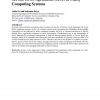Free Online Productivity Tools
i2Speak
i2Symbol
i2OCR
iTex2Img
iWeb2Print
iWeb2Shot
i2Type
iPdf2Split
iPdf2Merge
i2Bopomofo
i2Arabic
i2Style
i2Image
i2PDF
iLatex2Rtf
Sci2ools
119
click to vote
CORR
2010
Springer
2010
Springer
Service Level Agreement (SLA) in Utility Computing Systems
In recent years, extensive research has been conducted in the area of Service Level Agreement (SLA) for utility computing systems. An SLA is a formal contract used to guarantee that consumers‟ service quality expectation can be achieved. In utility computing systems, the level of customer satisfaction is crucial, making SLAs significantly important in these environments. Fundamental issue is the management of SLAs, including SLA autonomy management or trade off among multiple Quality of Service (QoS) parameters. Many SLA languages and frameworks have been developed as solutions; however, there is no overall classification for these extensive works. Therefore, the aim of this chapter is to present a comprehensive survey of how SLAs are created, managed and used in utility computing environment. We discuss existing use cases from Grid and Cloud computing systems to identify the level of SLA realization in state-of-art systems and emerging challenges for future research.
Related Content
| Added | 24 Jan 2011 |
| Updated | 24 Jan 2011 |
| Type | Journal |
| Year | 2010 |
| Where | CORR |
| Authors | Linlin Wu, Rajkumar Buyya |
Comments (0)

